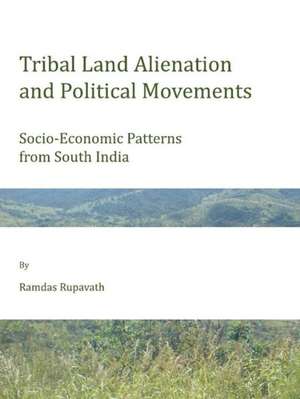Tribal Land Alienation and Political Movements: Socio-Economic Patterns from South India
Autor Ramdas Rupavathen Limba Engleză Hardback – 31 iul 2009
Preț: 452.16 lei
Nou
Puncte Express: 678
Preț estimativ în valută:
86.52€ • 94.28$ • 72.91£
86.52€ • 94.28$ • 72.91£
Carte indisponibilă temporar
Doresc să fiu notificat când acest titlu va fi disponibil:
Se trimite...
Preluare comenzi: 021 569.72.76
Specificații
ISBN-13: 9781443811101
ISBN-10: 1443811106
Pagini: 130
Dimensiuni: 150 x 220 mm
Greutate: 0 kg
Ediția:New.
Editura: Cambridge Scholars Publishing
ISBN-10: 1443811106
Pagini: 130
Dimensiuni: 150 x 220 mm
Greutate: 0 kg
Ediția:New.
Editura: Cambridge Scholars Publishing
Notă biografică
The study focuses upon the process of land alienation going on since the colonial period, the skewed patterns of socio-economic development in the tribal area after independence and the resulting political movements in Andhra Pradesh, South India. The existing literature shows that majority of the studies on tribes in Andhra Pradesh, South India have focused upon the sociological or anthropological aspects of tribal life, their exploitation or upon the leadership, strategy and tactics of the Naxalite movements, while ignoring the basic underlying causes. The processes of land alienation, due to the entry of non-tribals, commoditization of land, introduction of cash crops etc., which began under the feudal and oppressive Nizam State in Andhra Pradesh, South India. Further, our book tries to look at the policies of the colonial state that has been examined in detail and provide a background to the post colonial situation. It also shows that after independence, the land transfer regulation act, and the various developmental programmes introduced into the tribal area, has not yielded significant results. A detailed survey reveals that landlessness, unemployment, poverty and increasing social alienation from hostility towards non-tribals is increasing in these regions. It is these factors that underlie them often violent political movement in the pre and post independence movement which have been described in detail in our book. The study concludes that unless tribal lands and economy are protected, and a pattern of development better suited to their way of life is introduced, tribal oppression and movements keep on arises further in any backward regions. Our book hopes to fill this gap by establishing inter-linkages in socio-economic conditions of the tribal population of Andhra Pradesh, South India. Our book is interdisciplinary in nature and shall be useful to scholars and students of Political Economy, Political Science, Rural Development, Public Administration, Anthropology, Sociology, Gender Studies and Development. It is widely applicable to all sections of the marginalized socially, economically, culturally, academically, politically and other wise.
